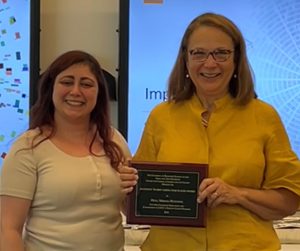
Hon. Miriam B. Hutchins, Associate Judge, District Court of Maryland, District 1, Baltimore City (Retired) and Rohina Zavala, CFCC TCAP Program Manager
By Hon. Miriam B. Hutchins, Associate Judge, District Court of Maryland, District 1, Baltimore City (Retired) and TCAP Volunteer Judge for over nine years
Volunteering as a judge in the Tackling Chronic Absenteeism Project (TCAP) has been a challenging and engaging experience, one full of eye-opening interactions with students and the TCAP team. I have had to develop new skills to work with students who are chronically absent from school. I learned from the students and from the TCAP staff about the patience, care, and commitment needed to have an impact on students’ attendance and ultimately their success in school.
TCAP is a program that spans the school year and meets with students weekly for about an hour. The meeting usually starts with an activity involving all students, such as a restorative circle or workshop. Then, individually, the students come to meet with “the Judge,” who talks to them about their attendance, their grades, helps them set goals, and monitors their progress in meeting their goals. Members of the TCAP team advise the students and provide support for the students and their families.
These students have complicated lives. Some students are taking on responsibilities that I never dreamt of at their age. In addition to getting themselves to school, they are responsible for a younger sibling who may be slow getting ready for school in the morning. Other students may work late at a job to support themselves or their families. Some students have moved in with a relative who lives across town from school. And some students are typical teenagers, who stay up too late playing electronic games.
TCAP helps students work through these barriers by fostering their determination and problem-solving skills. The program helps students look past short term difficulties and focus on long term goals. As part of the TCAP team, I do this by acknowledging the students’ myriad challenges. I ask students what they can change in the

By Hon. Miriam B. Hutchins, Associate Judge, District Court of Maryland, District 1, Baltimore City (Retired) and TCAP Volunteer Judge for over nine years with TCAP graduates.
ir schedule or behavior that will help them get to school and/or improve their goals. Often the students and I struggle with this for a while. They may not have had many opportunities to reflect on their challenges and problem-solve. I try to remain quiet and avoid telling them what to do. Of course, I make suggestions; I am there to guide them. There is a tension between providing guidance and fostering self-empowerment and problem-solving skills, especially when my time with the student is brief. I work on balancing the two. I try to remember that at their age they may focus on the expedient, rather than the long-range consequences of their choices.
In order to be more effective as a TCAP judge, I have also learned to value being part of a team. I have learned to rely on the experience and skills of my colleagues. I learn from their feedback if I am on the right track or need to recalibrate. Over the years, I have learned a lot from the one hour a week I volunteer in TCAP. I am working to ensure that the students benefit from my experience. Helping a student become motivated and achieve goals they set for themselves is not an easy job, but it is incredibly rewarding.